mean-的14种用法解释
- 格式:doc
- 大小:21.00 KB
- 文档页数:7
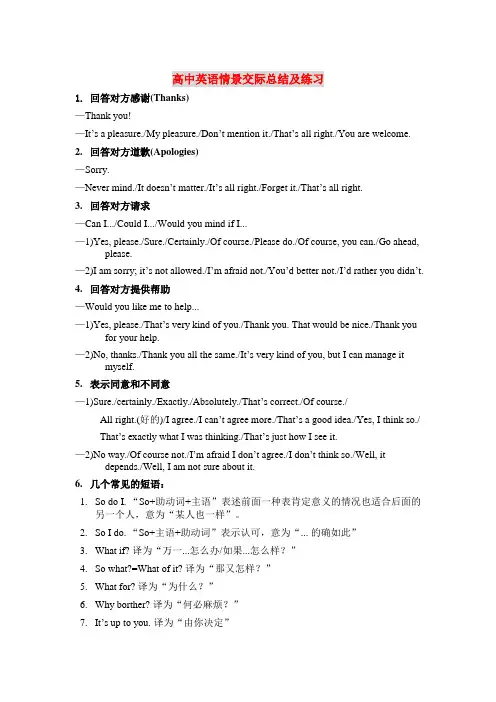
高中英语情景交际总结及练习1.回答对方感谢(Thanks)—Thank you!—It’s a pleasure./My pleasure./Don’t mention it./That’s all right./You are welcome. 2.回答对方道歉(Apologies)—Sorry.—Never mind./It doesn’t matter./It’s all right./Forget it./That’s all right.3.回答对方请求—Can I.../Could I.../Would you mind if I...—1)Yes, please./Sure./Certainly./Of course./Please do./Of course, you can./Go ahead, please.—2)I am sorry; it’s not allowed./I’m afraid not./You’d better not./I’d rather you didn’t.4.回答对方提供帮助—Would you like me to help...—1)Yes, please./That’s very kind of you./Thank you. That would be nice./Thank you for your help.—2)No, thanks./Thank you all the same./It’s very kind of you, but I can manage it myself.5.表示同意和不同意—1)Sure./certainly./Exactly./Absolutely./That’s correct./Of course./All right.(好的)/I agree./I can’t agree more./That’s a good idea./Yes, I think so./ That’s exactly what I was thinking./That’s just how I see it.—2)No way./Of course not./I’m afraid I don’t agree./I don’t think so./Well, it depends./Well, I am not sure about it.6.几个常见的短语:1.So do I. “So+助动词+主语”表述前面一种表肯定意义的情况也适合后面的另一个人,意为“某人也一样”。
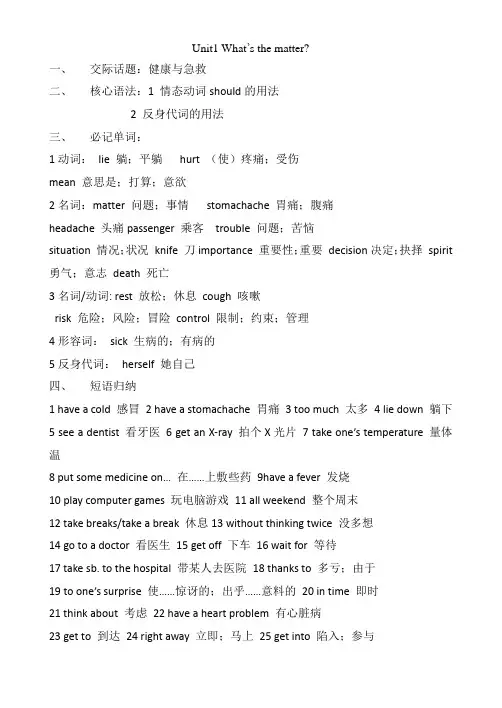
Unit1 What’s the matter?一、交际话题:健康与急救二、核心语法:1 情态动词should的用法2 反身代词的用法三、必记单词:1动词:lie 躺;平躺hurt (使)疼痛;受伤mean 意思是;打算;意欲2名词:matter 问题;事情stomachache 胃痛;腹痛headache 头痛passenger 乘客trouble 问题;苦恼situation 情况;状况knife 刀importance 重要性;重要decision决定;抉择spirit 勇气;意志death 死亡3名词/动词: rest 放松;休息cough 咳嗽risk 危险;风险;冒险control 限制;约束;管理4形容词:sick 生病的;有病的5反身代词:herself 她自己四、短语归纳1 have a cold 感冒2 have a stomachache 胃痛3 too much 太多4 lie down 躺下5 see a dentist 看牙医6 get an X-ray 拍个X光片7 take one’s temperature 量体温8 put some medicine on…在……上敷些药9have a fever 发烧10 play computer games 玩电脑游戏11 all weekend 整个周末12 take breaks/take a break 休息13 without thinking twice 没多想14 go to a doctor 看医生15 get off 下车16 wait for 等待17 take sb. to the hospital 带某人去医院18 thanks to 多亏;由于19 to one’s surprise 使……惊讶的;出乎……意料的20 in time 即时21 think about 考虑22 have a heart problem 有心脏病23 get to 到达24 right away 立即;马上25 get into 陷入;参与26 do the right thing 做正确的事27 fall down 摔倒;跌倒28 play soccer 踢足球29 put…on sth. 把……放在某物上30 a few 一些;几个31 come in 进来32 get hit/sunburned 被打击/晒伤33 be interested in 对…..感兴趣34 take risks/ take a risk 冒险35 lose one’s life 失去生命36 because of 因为37 by oneself 独自;单独38 run out (of) 用完;耗尽39 cut off 切除40 get out of 离开;从……出来41 make a decision/ make decisions 做决定42 be in control of 掌管;管理43 go mountain climbing 去爬山44 give up 放弃五用法集萃1 need to do sth. 需要做某事2 see sb. doing sth. 看见某人正在做某事3 ask sb. sth 询问某人某事4 expect sb. to do sth 期待/期望某人做某事5 agree to do sth. 同意做某事6 help sb. (to) do sth. 帮助某人做某事7 want to do sth 想要做某事8 tell sb to do sth 告诉某人做某事9 have problems (in) doing sth 做某事有困难10 be/ get used to doing sth 习惯于做某事11 use sth. to do sth. 用某物做某事12 seem to do sth 好像做某事13 keep on doing sth 继续做某事14 mind doing sth. 介意做某事Unit2 I’ll help to clean up the city parks.一、交际话题:志愿服务和慈善活动二、核心与法:1 用could 表达建议2动词不定式的用法三、必记单词:1 动词: cheer欢呼;喝彩raise 募集;征集repair 修理;修补open 开,打开train 训练;培训imagine 想象understand 理解;领会2 名词/动词: 通知;通告;注意/注意到,意识到change 变化;改变interest 兴趣;关注/使感兴趣;使关注3 形容词:lonely 孤独的;寂寞的strong 强烈的;强壮的broken 破损的;残缺的excited 激动的;兴奋的4 副词:alone 独自;单独5 代词:several 几个;数个四、短语归纳1 clean up 打扫(或清除)干净2 cheer up (使)变得更高兴;振奋起来3 give out 分发;散发4 used to 曾经……; 过去……5 give away 赠送;捐赠6 set up 建起;设立7 make a difference 影响;有作用8 come up with 想出;提出(主意、计划、回答等)9 put off 推迟10 put up 张贴;搭建;举起11 call up 打电话给(某人);征召12 help out 帮助……摆脱困境13 care for 照顾;非常喜欢14 give up 放弃15 try out 参与……选拔;试用16 come true 实现17 run out of 用完;耗尽18 take after (外貌或行为)像19 fix up 修理;装饰20 be similar to 与……相似21 be strong in 擅长…… 22 work out fine 奏效23 be excited about…对……感到兴奋、激动五、用法集萃1 need to do sth 需要做某事2 make plans to do sth 制定计划做某事3 ask sb(not) to do sth 要求某人(不要)做某事4 used to do sth 过去常常做某事5 give up+时间+to do sth 腾出时间做某事6 get a feeling of 产生……的感觉7 decide to do sth 决定做某事8 help sb. (to)do sth 帮助某人做某事9 make a difference to 对……产生影响10 make it possible for sb. to do sth 使得做某事对某人来说成为可能Unit3 Could you please clean your room?一、交际话题:家务琐事和许可二、核心语法:1 用could 提出请求 2 用could 征求许可三、必记单词:1 动词:fold 折叠;对折sweep 扫;打扫throw 扔;掷pass 给;递;走过;通过borrow 借;借用lend 借给;借出hate 厌恶;讨厌provide 提供;供应depend 依靠;信赖develop 发展;壮大drop 落下;掉下2 名词/动词: waste浪费;垃圾/ 浪费;滥用3 名词:rubbish 垃圾;废弃物stress 精神压力;心理负担fairness 公正性;合理性4 形容词:ill 有病;不舒服unfair 不合理的;不公正的5 其他: neither adv 也不pron两者都不while conj与……同时;当……的时候;而;然而since conj 因为;既然prep., conj. &adv.从......以后;自……以来四、短语归纳1 do the dishes 洗餐具2 take out the rubbish 倒垃圾3 fold the clothes 叠衣服4 sweep the floor 扫地5 make the bed 铺床6 work on 从事;创作7 clean the living room 打扫起居室8 go out 出去9 stay out 待在外面;不在家10 help out帮助做完某事11 in front of 在……前面12 come over 过来;顺便来访13 hangout 闲逛14 do chores 做家务15 at least 至少16 throw down 扔下17 all the time 频繁;反复18 in surprise 吃惊地;惊讶地19 as soon as 一……就……20 a waste of time 浪费时间21 spend…on…在……上花费(时间或金钱)22 in order to 目的是;为了23 depend on 依靠;信赖24 look after 照顾;照料25 keep it clean and tidy 保持它干净、整洁26 get into 进入27 take care of 照顾;处理28 as a result 结果29 fall ill 生病五、用法集萃1 finish doing sth 做完某事2 Neither+ 连系动词be/助动词/情态动词+主语……也不3 as…as…与……一样……4 want sb to do sth 想要某人做某事5 try (not) to do sth 尽力(不)做某事6 hate to do sth 厌恶做某事7 make sb do sth 让/使某人做某事8 let sb do sth 让某人做某事9 spend…doing sth 花费……做某事10 provide sth for sb 向某人提供某物11 mind doing sth 介意做某事12 learn to do sth 学会做某事13 learn how to do sth 学会怎样做某事14 the+ 比较级…, the +比较级…越……, 就越……15 do one’s part in (doing) sth 尽自己的职责做某事Unit4 Why don’t you talk to your parents?一、交际话题:人际交往二、核心语法:1 until; so that; although 引导的状语从句2 Why don’t you..? 句型三、必记单词:1 动词:allow 允许;准许guess 猜测;估计;argue 争吵;争论offer 主动提出;自愿给予explain 解释;说明return 归还;回来;返回compete 竞争;对抗continue 持续;继续存在compare 比较2 形容词:wrong 有毛病的;错误的elder 年纪较长的nervous 焦虑的;担忧的clear 清晰易懂的;明朗的quick 快的;迅速的;时间短暂的usual 通常的;寻常的3 名词:relation 关系;联系;交往communication 交流;沟通pressure 压力opinion 意见;想法;看法development 发展;发育;成长4 副词: instead 代替;反而;却5 代词:whatever 任何;每一四、短语归纳1 hang out 闲逛2 too many 太多(修饰可数名词复数)3 get into a fight 争吵4 go to sleep 去睡觉5 call sb. (up) 给某人打电话6 be good at 擅长7 talk about 谈论8 on the phone 在电话中9 have a fight 吵架10 look through 快速查看;浏览11 give back 归还12 be angry with sb 生某人的气13 big deal 重要的事14 thanks for 因……而感谢15 no problem 没问题16 work out 成功地发展;解决17 get on with 和睦相处;关系良好18 feel lonely 感到孤独19 sit down 坐下20 communicate with sb 与某人交流21 next time 下一次22 make friends 交朋友23 be worried about 担心…… 24 study for a test 为考试而学习25 be afraid of害怕…… 26 in front of 在……前面27 not anymore 不再…… 28 play sports 做体育运动29 watch movies 看电影30 so much/many 那么多31 do homework 做家庭作业32 have lessons 上课33 do chores 做家务34 cut out 删除;删去35 a few 几个;少数36 all kinds of 各种各样的37 compare… with …把…与…比较38 join after- school activities 参加课外活动39 in one’s opinion 依……看40 turn down 关小五、用法集萃1 allow sb to do sth 允许某人做某事2 why don’t you do sth? 你为什么不做某事呢?3 want to do sth 想要做某事4 find sb doing sth 发现某人正在做某事5 tell sb to do sth 告诉某人做某事6 refuse to do sth 拒绝做某事7 let sb do sth 让某人做某事8 offer to do sth 主动提出做某事9 mind sb doing sth 介意某人做某事10 not…until…直到……才…..11 want sb to do sth 想要某人做某事12 It’s time for sth 该做某事了13 it’s + adj + to do sth 做某事是……的14 keep on doing sth 继续做……15 What do you think of…? 你认为……怎么样?Unit5 What were you doing when the rainstorm came?一、交际话题:难忘的事件二、 1 When, while 引导的时间状语从句2 过去进行时的用法和句式变化三、必记单词1 动词:begin 开始beat 敲打;打败kid 开玩笑;欺骗realize 理解;领会;认识到2 名词:storm 暴风雨;light光;光线;光亮passage章节;段落pupil 学生silence 沉默;缄默;无声date 日期;日子truth 实情;事实3 动词/名词:report 报道;公布rise 升起;增加;提高4 形容词:strange 奇怪的;奇特的asleep 睡着5 副词:heavily 很大程度上;大量地suddenly 突然;忽然completely 彻底地;完全地recently 不久前;最近6 介词:against 倚;碰;撞四、短语归纳:1 wait for 等候2 look for 寻找3 go off 闹钟发出响声4 take a shower 洗淋浴5 pick up 接电话6 make sure 务必;确保7 have fun 玩得开心8 fall asleep 进入梦乡9 die down 逐渐变弱;逐渐消失10 wake up 醒来;叫醒11 in a mess 凌乱不堪;乱七八糟12 clean up 打扫干净13 in times of difficulty 在困难时期14 take photos 拍照;照相15 play the piano 弹钢琴16 turn on 打开17 listen to the radio 听收音机18 right away 立刻;马上19 have a look 看一看20 get to 到达21 because of 因为22 make one’s way 前往;费力地前往23 in silence 沉默;无声24 take down 拆除;往下拽;记录25 at first 首先26 tell the truth 说实话27 point out 指出28 go away 离去29 three times a week 每周三次30 call out 大声呼救31 have meaning to sb 对某人有特殊的意义32 with no light outside 外面没有光五、用法集萃:1 be busy doing sth 忙于做某事2 see sb/sth doing sth 看见某人/某物正在做某事3 begin/ start to do sth 开始做某事4 try to do sth 努力做某事5 It’s + adj. + to do sth 做某事是……的6 have trouble (in) doing sth 做某事有困难或麻烦。
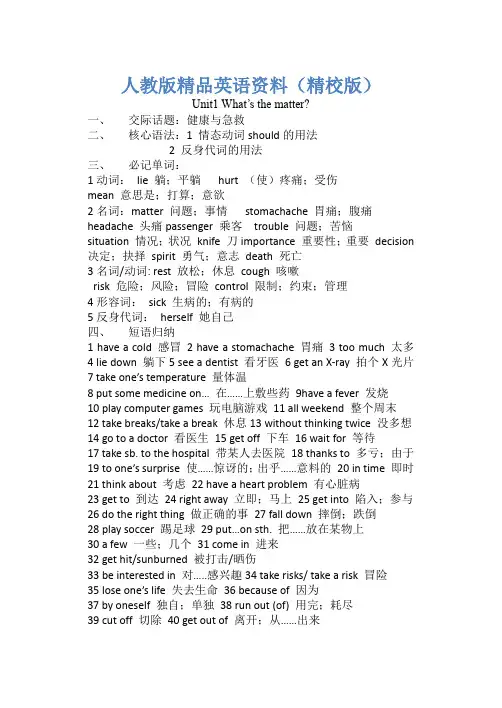
人教版精品英语资料(精校版)Unit1 What’s the matter?一、交际话题:健康与急救二、核心语法:1 情态动词should的用法2 反身代词的用法三、必记单词:1动词:lie 躺;平躺hurt (使)疼痛;受伤mean 意思是;打算;意欲2名词:matter 问题;事情stomachache 胃痛;腹痛headache 头痛passenger 乘客trouble 问题;苦恼situation 情况;状况knife 刀importance 重要性;重要decision 决定;抉择spirit 勇气;意志death 死亡3名词/动词: rest 放松;休息cough 咳嗽risk 危险;风险;冒险control 限制;约束;管理4形容词:sick 生病的;有病的5反身代词:herself 她自己四、短语归纳1 have a cold 感冒2 have a stomachache 胃痛3 too much 太多4 lie down 躺下5 see a dentist 看牙医6 get an X-ray 拍个X光片7 take one’s temperature 量体温8 put some medicine on…在……上敷些药9have a fever 发烧10 play computer games 玩电脑游戏11 all weekend 整个周末12 take breaks/take a break 休息13 without thinking twice 没多想14 go to a doctor 看医生15 get off 下车16 wait for 等待17 take sb. to the hospital 带某人去医院18 thanks to 多亏;由于19 to one’s surprise 使……惊讶的;出乎……意料的20 in time 即时21 think about 考虑22 have a heart problem 有心脏病23 get to 到达24 right away 立即;马上25 get into 陷入;参与26 do the right thing 做正确的事27 fall down 摔倒;跌倒28 play soccer 踢足球29 put…on sth. 把……放在某物上30 a few 一些;几个31 come in 进来32 get hit/sunburned 被打击/晒伤33 be interested in 对…..感兴趣34 take risks/ take a risk 冒险35 lose one’s life 失去生命36 because of 因为37 by oneself 独自;单独38 run out (of) 用完;耗尽39 cut off 切除40 get out of 离开;从……出来41 make a decision/ make decisions 做决定42 be in control of 掌管;管理43 go mountain climbing 去爬山44 give up 放弃五用法集萃1 need to do sth. 需要做某事2 see sb. doing sth. 看见某人正在做某事3 ask sb. sth 询问某人某事4 expect sb. to do sth 期待/期望某人做某事5 agree to do sth. 同意做某事6 help sb. (to) do sth. 帮助某人做某事7 want to do sth 想要做某事8 tell sb to do sth 告诉某人做某事9 have problems (in) doing sth 做某事有困难10 be/ get used to doing sth 习惯于做某事11 use sth. to do sth. 用某物做某事12 seem to do sth 好像做某事13 keep on doing sth 继续做某事14 mind doing sth. 介意做某事Unit2 I’ll help to clean up the city parks.一、交际话题:志愿服务和慈善活动二、核心与法:1 用could 表达建议2动词不定式的用法三、必记单词:1 动词: cheer欢呼;喝彩raise 募集;征集repair 修理;修补open 开,打开train 训练;培训imagine 想象understand 理解;领会2 名词/动词: 通知;通告;注意/注意到,意识到change 变化;改变interest 兴趣;关注/使感兴趣;使关注3 形容词:lonely 孤独的;寂寞的strong 强烈的;强壮的broken 破损的;残缺的excited 激动的;兴奋的4 副词:alone 独自;单独5 代词:several 几个;数个四、短语归纳1 clean up 打扫(或清除)干净2 cheer up (使)变得更高兴;振奋起来3 give out 分发;散发4 used to 曾经……; 过去……5 give away 赠送;捐赠6 set up 建起;设立7 make a difference 影响;有作用8 come up with 想出;提出(主意、计划、回答等)9 put off 推迟10 put up 张贴;搭建;举起11 call up 打电话给(某人);征召12 help out 帮助……摆脱困境13 care for 照顾;非常喜欢14 give up 放弃15 try out 参与……选拔;试用16 come true 实现17 run out of 用完;耗尽18 take after (外貌或行为)像19 fix up 修理;装饰20 be similar to 与……相似21 be strong in 擅长…… 22 work out fine 奏效23 be excited about…对……感到兴奋、激动五、用法集萃1 need to do sth 需要做某事2 make plans to do sth 制定计划做某事3 ask sb(not) to do sth 要求某人(不要)做某事4 used to do sth 过去常常做某事5 give up+时间+to do sth 腾出时间做某事6 get a feeling of 产生……的感觉7 decide to do sth 决定做某事8 help sb. (to)do sth 帮助某人做某事9 make a difference to 对……产生影响10 make it possible for sb. to do sth 使得做某事对某人来说成为可能Unit3 Could you please clean your room?一、交际话题:家务琐事和许可二、核心语法:1 用could 提出请求 2 用could 征求许可三、必记单词:1 动词:fold 折叠;对折sweep 扫;打扫throw 扔;掷pass 给;递;走过;通过borrow 借;借用lend 借给;借出hate 厌恶;讨厌provide 提供;供应depend 依靠;信赖develop 发展;壮大drop 落下;掉下2 名词/动词: waste浪费;垃圾/ 浪费;滥用3 名词:rubbish 垃圾;废弃物stress 精神压力;心理负担fairness 公正性;合理性4 形容词:ill 有病;不舒服unfair 不合理的;不公正的5 其他: neither adv 也不pron两者都不while conj与……同时;当……的时候;而;然而since conj 因为;既然prep., conj. &adv.从......以后;自……以来四、短语归纳1 do the dishes 洗餐具2 take out the rubbish 倒垃圾3 fold the clothes 叠衣服4 sweep the floor 扫地5 make the bed 铺床6 work on 从事;创作7 clean the living room 打扫起居室8 go out 出去9 stay out 待在外面;不在家10 help out帮助做完某事11 in front of 在……前面12 come over 过来;顺便来访13 hangout 闲逛14 do chores 做家务15 at least 至少16 throw down 扔下17 all the time 频繁;反复18 in surprise 吃惊地;惊讶地19 as soon as 一……就……20 a waste of time 浪费时间21 spend…on…在……上花费(时间或金钱)22 in order to 目的是;为了23 depend on 依靠;信赖24 look after 照顾;照料25 keep it clean and tidy 保持它干净、整洁26 get into 进入27 take care of 照顾;处理28 as a result 结果29 fall ill 生病五、用法集萃1 finish doing sth 做完某事2 Neither+ 连系动词be/助动词/情态动词+主语……也不3 as…as…与……一样……4 want sb to do sth 想要某人做某事5 try (not) to do sth 尽力(不)做某事6 hate to do sth 厌恶做某事7 make sb do sth 让/使某人做某事8 let sb do sth 让某人做某事9 spend…doing sth 花费……做某事10 provide sth for sb 向某人提供某物11 mind doing sth 介意做某事12 learn to do sth 学会做某事13 learn how to do sth 学会怎样做某事14 the+ 比较级…, the +比较级…越……, 就越……15 do one’s part in (doing) sth 尽自己的职责做某事Unit4 Why don’t you talk to your parents?一、交际话题:人际交往二、核心语法:1 until; so that; although 引导的状语从句2 Why don’t you..? 句型三、必记单词:1 动词:allow 允许;准许guess 猜测;估计;argue 争吵;争论offer 主动提出;自愿给予explain 解释;说明return 归还;回来;返回compete 竞争;对抗continue 持续;继续存在compare 比较2 形容词:wrong 有毛病的;错误的elder 年纪较长的nervous 焦虑的;担忧的clear 清晰易懂的;明朗的quick 快的;迅速的;时间短暂的usual 通常的;寻常的3 名词:relation 关系;联系;交往communication 交流;沟通pressure 压力opinion 意见;想法;看法development 发展;发育;成长4 副词: instead 代替;反而;却5 代词:whatever 任何;每一四、短语归纳1 hang out 闲逛2 too many 太多(修饰可数名词复数)3 get into a fight 争吵4 go to sleep 去睡觉5 call sb. (up) 给某人打电话6 be good at 擅长7 talk about 谈论8 on the phone 在电话中9 have a fight 吵架10 look through 快速查看;浏览11 give back 归还12 be angry with sb 生某人的气13 big deal 重要的事14 thanks for 因……而感谢15 no problem 没问题16 work out 成功地发展;解决17 get on with 和睦相处;关系良好18 feel lonely 感到孤独19 sit down 坐下20 communicate with sb 与某人交流21 next time 下一次22 make friends 交朋友23 be worried about 担心…… 24 study for a test 为考试而学习25 be afraid of害怕…… 26 in front of 在……前面27 not anymore 不再…… 28 play sports 做体育运动29 watch movies 看电影30 so much/many 那么多31 do homework 做家庭作业32 have lessons 上课33 do chores 做家务34 cut out 删除;删去35 a few 几个;少数36 all kinds of 各种各样的37 compare… with …把…与…比较38 join after- school activities 参加课外活动39 in one’s opinion 依……看40 turn down 关小五、用法集萃1 allow sb to do sth 允许某人做某事2 why don’t you do sth? 你为什么不做某事呢?3 want to do sth 想要做某事4 find sb doing sth 发现某人正在做某事5 tell sb to do sth 告诉某人做某事6 refuse to do sth 拒绝做某事7 let sb do sth 让某人做某事8 offer to do sth 主动提出做某事9 mind sb doing sth 介意某人做某事10 not…until…直到……才…..11 want sb to do sth 想要某人做某事12 It’s time for sth 该做某事了13 it’s + adj + to do sth 做某事是……的14 keep on doing sth 继续做……15 What do you think of…? 你认为……怎么样?Unit5 What were you doing when the rainstorm came?一、交际话题:难忘的事件二、 1 When, while 引导的时间状语从句2 过去进行时的用法和句式变化三、必记单词1 动词:begin 开始beat 敲打;打败kid 开玩笑;欺骗realize 理解;领会;认识到2 名词:storm 暴风雨;light光;光线;光亮passage章节;段落pupil 学生silence 沉默;缄默;无声date 日期;日子truth 实情;事实3 动词/名词:report 报道;公布rise 升起;增加;提高4 形容词:strange 奇怪的;奇特的asleep 睡着5 副词:heavily 很大程度上;大量地suddenly 突然;忽然completely 彻底地;完全地recently 不久前;最近6 介词:against 倚;碰;撞四、短语归纳:1 wait for 等候2 look for 寻找3 go off 闹钟发出响声4 take a shower 洗淋浴5 pick up 接电话6 make sure 务必;确保7 have fun 玩得开心8 fall asleep 进入梦乡9 die down 逐渐变弱;逐渐消失10 wake up 醒来;叫醒11 in a mess 凌乱不堪;乱七八糟12 clean up 打扫干净13 in times of difficulty 在困难时期14 take photos 拍照;照相15 play the piano 弹钢琴16 turn on 打开17 listen to the radio 听收音机18 right away 立刻;马上19 have a look 看一看20 get to 到达21 because of 因为22 make one’s way 前往;费力地前往23 in silence 沉默;无声24 take down 拆除;往下拽;记录25 at first 首先26 tell the truth 说实话27 point out 指出28 go away 离去29 three times a week 每周三次30 call out 大声呼救31 have meaning to sb 对某人有特殊的意义32 with no light outside 外面没有光五、用法集萃:1 be busy doing sth 忙于做某事2 see sb/sth doing sth 看见某人/某物正在做某事3 begin/ start to do sth 开始做某事4 try to do sth 努力做某事5 It’s + adj. + to do sth 做某事是……的6 have trouble (in) doing sth 做某事有困难或麻烦。

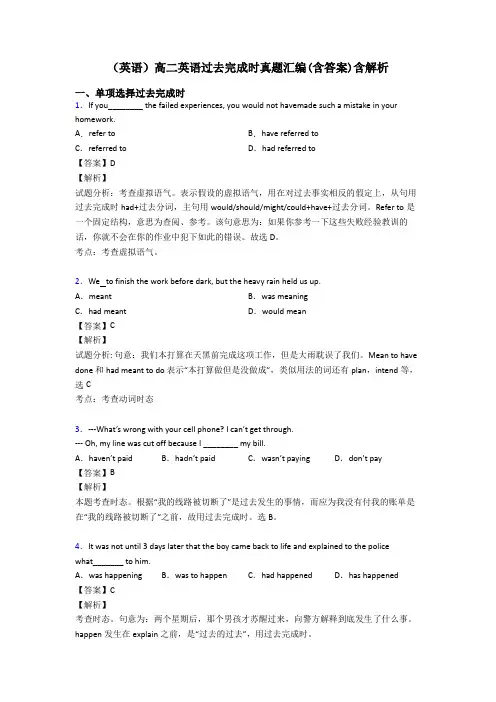
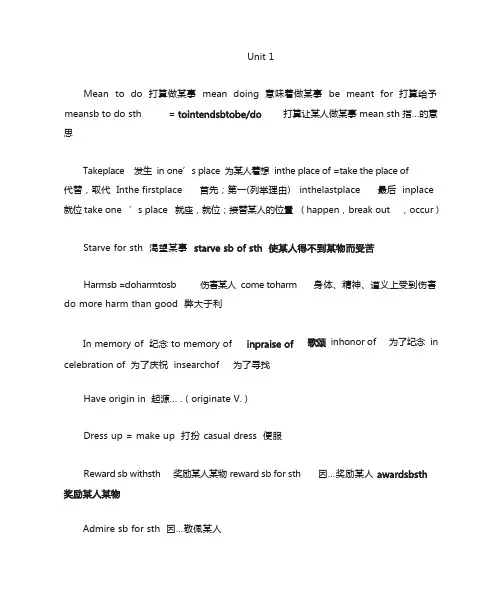
Unit 1Mean to do 打算做某事 mean doing 意味着做某事 be meant for 打算给予打算让某人做某事 mean sth 指…的意思Takeplace 发生in one’s place 为某人着想 inthe place of =take the place of代替,取代 Inthe firstplace 首先;第一(列举理由) inthelastplace 最后 inplace 就位 take one ’s place 就座,就位;接替某人的位置 ( happen,break out ,occur )Starve for sth 渴望某事Harmsb =doharmtosb 伤害某人 come toharm do more harm than good 弊大于利In memory of 纪念celebration of 为了庆祝 insearchof 为了寻找Have origin in 起源… . ( originate V. )Dress up = make up 打扮 casual dress 便服Reward sb withsth 奖励某人某物 reward sb for sthAdmire sb for sth 因…敬佩某人身体、精神、道义上受到伤害为了纪念 in 因…奖励某人Look forward to sth / doing sth 期待做某事Have funwith =enjoy oneself = have a goodtime 玩得开心 have funindoing sth 做某事开心Turnup 露脸关掉 turnon 打开 turntosbfor help向某人求助 turn out to beKeep one’s word 守信 = promise break one’s word 失信和某人谈话 havewords withsb 与某人发生口角 in other words 换句话说 in a word 一句话;总而言之Held one’s breath 屏住呼吸 take one ’s breath 呼吸 get one’s breath 喘过气来 be out of breath 喘不过气来Play a trick onsb 搞恶作剧;诈骗;开玩笑Gain in sth 增加,增长 gain on sb 逼近,接近Day and night 日夜;昼夜;整天Apologize to sb for sth 因…向某人道歉 = make an apology to sb = owe sb anapologyRemind … of … 使… 想起…对… 满意Stick to 坚持习惯于…devote .. to 致力于… the key to 关键是这些 to 都是介词Drown … in … 借…消愁Of all kinds 各种各样 all kinds of 各种各样的 the same kind of 相同种类的Show honor to sb = show respect to sb 尊敬某人In the shape of 以…的形式和某人结婚动身;启程 set up 建立,创立 set down = write down 记下Unit 22. ought to 应该(语气重一些) should 应该3. lose weight 减肥 put on weight 增肥4. Get away with 被放过;做坏事不受惩罚说谎讲真话6. win … back 赢回7. consult sb about sth 咨询某人某事8. earn one’s living 谋生 earn a living =make a living = make one ’s living欠债10. glare at 怒目而视 glance at 瞥一眼 stare at 盯着11. spy on 监视,侦查12. Before long 不久以后 long before 不久以前13. cut down 消减,删节 cut up 切碎14. balanced diet 平衡的饮食 balance of nature 生态平衡17. in this way 用这种方法 by the way 顺便说一下18. agree with sb / withone ’s words 同意某人,同意某人的话或观点 agree on sth 就…达成一致意见 agree todo 同意做某事19. neither … nor … 既不…也不… either … or … 或者…或者… rather than 与其…不如21. have/get sb do(done/doing) 让某人做某事、被做某事、一直做某事22. be amazed at 对…惊讶重点句子:1. His fried rice was hot but did not taste of fat.2. Tired of all that fat? Want to be thinner? Only slimming food served here.3. I will take all that fat off you in two weeks if you eat here every day.4. Somethingterrible must have happened if Lichangwas not comingto eatwith him as hi always did.5. He wondered if he should go to the library to find out.6. He couldn’t have Yong Hui getting away with telling people lies.Unit 31. despite = in spite of 尽管2. to be honest = to be frank = to tell the truth 说实话抚养,培养,教育,提出;呕吐4. make a bet (on sth with sb ) 就某事和某人打赌 = bet on sth accept/lost/win/take up a bet5. permit sth/to do sth 允许做某事6. go ahead 前进;可以;继续说7. by accident = by chance 偶然,无意中,不小心导致;做出解释9. on the contrary 正相反10. hit the spot 和口味 on the spot 现场 put sb on the spot 让某人难堪11. be patient with 对…有耐心 be out of patience 对…耐不住 have no patience with 不能容忍 in patience 耐心地冒险13. in rags 衣衫褴褛14. as for 至于;关于’s way to 在去… 的路上从某种程度上说 by the way顺便说一下19. pretend to be 假装是 pretend to do 假装做 pretend to be doing 假装正在做 pretend to have done 假装已经做了 pretend that + clause 假装21. be in trouble 在困境中 get out of trouble 摆脱困境 have trouble in doing 做某事有困难重点句子:1. You’re about to hear the most incredible tale.2. It is the summer of 1903, … has had some very bad luck.3. Goodmorning,sir, wouldyouplease come in? Permit me toleadthe way.4. As a matter of fact, I landed in Britain by accident.5. I found myself carried out to sea by a strong wind.6. The next morning, I’d just about given myself up for lost when I was spotted by a ship.7. Now, if you excuse me, I think I’ ll be on my way.8. As for the bill, sir, please forget it.9. It’s well-known that many Americans like to eat a lot. Well, we will have to take a chance.10. I earned my passage by working … which accounts for my appearance.11. Just having you sit here is a great honour.12. Indeed, sir, I trust you ’ll come here whenever you like.13. A fathom is equal to six feet or 1.83 metres.14. His writing became famous for its descriptionof common people and the way they talked, but especially for his humour.Unit 41. separate A from B 把 A 和 B 分开2. in time = finally = at last = in the end 最后,终于 in no time 立刻;立即 at any time 在任何时候有时,偶尔 on time 按时;准时3. be fundamental to 对…是基础的,重要的4. a chain reaction 连锁反应5. give birth to 产生…6. in one’s turn 轮到某人7. prevent = stop … from doing 阻止…做某事 keep … fromdoingsth 阻止某人做某事此时不可省略 from ,省略 from 意为让某人一直做某事太阳系 a railway system 铁路系统 a social system 社会制度10. be harmful to = do harm to 对…有害11. lay eggs 下蛋 lay-laid-laid12. cheer up 感到高兴;感到振奋13. now that 既然14. get the hang of 熟悉;掌握;理解爆发;突发拆散,打碎 breakdown 分解,不成功,毁坏 break into 破门而入16. watch out 密切注视;当心,提防17. encourage sb to do sth 鼓励某人做某事18. be filled with = be full of 充满19. depend on 依赖,依靠 rely on 依赖,依靠理论联系实际21. atmosphere pressure 大气压24. be puzzled by 对…感到困惑 puzzle over sth 对某事苦苦思索 puzzle out sth许多重点句子:1. Last month I was lucky enough to have a chance to make a trip … .2. Leaving the moon’s gravity was not as painful as leaving the earth ’s.3. Now that you are free, why don ’t you go to the seaside to enjoy yourself?4. I found I was carried twice as far as (I was) on the earth and fell over.5. They are putting too much carbon dioxide into the atmosphere, which prevent heat from escaping from the earth into the space.Unit 51. be on a trip to sp 去某地的旅游2. rather than 与其 prefer to do ...rather than to do 宁愿做…而不愿做…3. all the way 一直,一路上4. on the Atlantic coast 在大西洋海岸5. at the airport 在飞机场6. look across 俯瞰7. go up 登上8. go on a trip 去旅游10. as far as 和…一样远定居;平静下来13. manage to do 设法做14. catch sight of 看见,瞥见15. have a gift for 对…有天赋16. confirm sth in sth 使确信在远方18. a wealth of 大量 +不可数19. mix A with B 把 A 和 B 混起来21. a book of travels / travel books 游记 travel service 旅行社22. surround sth with sth = sth be surrounded by/with sth 包围着重点句子:1. It is the second largest country in the world.2. The thought that they could cross the whole continent was exciting.3. Some people have the idea that youcancross Canada inless thanfive days.4. There is more freshwater inCanada thaninany other country onthe world.5. The girls were surprised at the fact that oceanships cansail up the GreatLakes.。
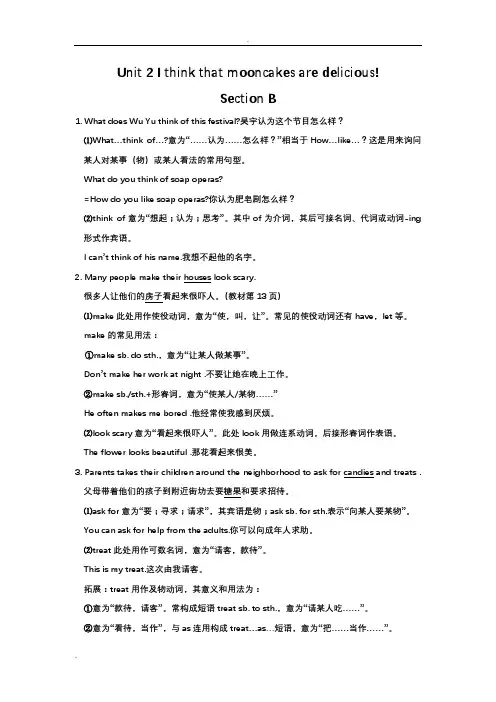
Unit 2 I think that mooncakes are delicious!Section B1. What does Wu Yu think of this festival?吴宇认为这个节目怎么样?⑴What…think of…?意为“……认为……怎么样?”相当于How…like…?这是用来询问某人对某事(物)或某人看法的常用句型。
What do you think of soap operas?=How do you like soap operas?你认为肥皂剧怎么样?⑵think of意为“想起;认为;思考”。
其中of为介词,其后可接名词、代词或动词-ing 形式作宾语。
I can’t think of his name.我想不起他的名字。
2. Many people make their houses look scary.很多人让他们的房子看起来很吓人。
(教材第13页)⑴make此处用作使役动词,意为“使,叫,让”。
常见的使役动词还有have,let等。
make的常见用法:①make sb. do sth.,意为“让某人做某事”。
Don’t make her work at night.不要让她在晚上工作。
②make sb./sth.+形容词,意为“使某人/某物……”He often makes me bored.他经常使我感到厌烦。
⑵look scary意为“看起来很吓人”。
此处look用做连系动词,后接形容词作表语。
The flower looks beautiful.那花看起来很美。
3. Parents takes their children around the neighborhood to ask for candies and treats.父母带着他们的孩子到附近街坊去要糖果和要求招待。
⑴ask for意为“要;寻求;请求”,其宾语是物;ask sb. for sth.表示“向某人要某物”。
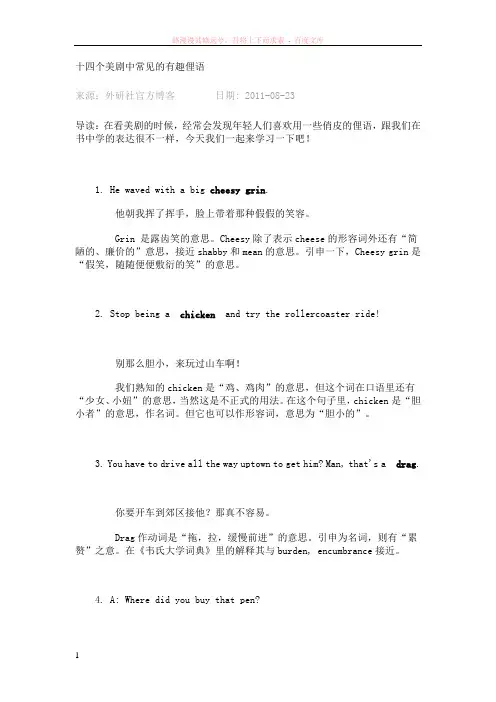
十四个美剧中常见的有趣俚语来源:外研社官方博客日期: 2011-08-23导读:在看美剧的时候,经常会发现年轻人们喜欢用一些俏皮的俚语,跟我们在书中学的表达很不一样,今天我们一起来学习一下吧!1. He waved with a big cheesy grin.他朝我挥了挥手,脸上带着那种假假的笑容。
Grin 是露齿笑的意思。
Cheesy除了表示cheese的形容词外还有“简陋的、廉价的”意思,接近shabby和mean的意思。
引申一下,Cheesy grin是“假笑,随随便便敷衍的笑”的意思。
2. Stop being a chicken and try the rollercoaster ride!别那么胆小,来玩过山车啊!我们熟知的chicken是“鸡、鸡肉”的意思,但这个词在口语里还有“少女、小妞”的意思,当然这是不正式的用法。
在这个句子里,chicken是“胆小者”的意思,作名词。
但它也可以作形容词,意思为“胆小的”。
3. You have to drive all the way uptown to get him? Man, that's a drag.你要开车到郊区接他?那真不容易。
Drag作动词是“拖,拉,缓慢前进”的意思。
引申为名词,则有“累赘”之意。
在《韦氏大学词典》里的解释其与burden, encumbrance接近。
4. A: Where did you buy that pen?B: Oh this? It's a freebie I got at the carnival.A: 你在哪买的那支笔?B: 这支啊?这是我在嘉年华得的免费赠品。
Freebie 一看就是从free而来,是不是很形象呢?这是个美国俚语词。
还有个同义形近词freeby,也许是同一个词的两种不同拼法吧。
5. I'm going to study full-on for this next exam.我要全力以赴准备下次考试了。
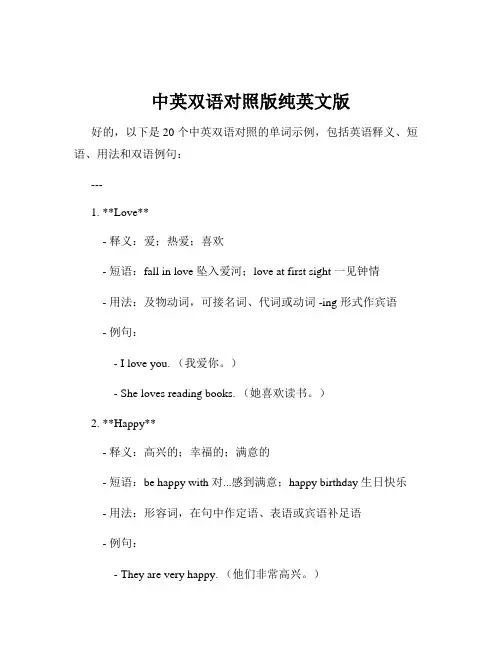
中英双语对照版纯英文版好的,以下是 20 个中英双语对照的单词示例,包括英语释义、短语、用法和双语例句:---1. **Love**- 释义:爱;热爱;喜欢- 短语:fall in love 坠入爱河;love at first sight 一见钟情- 用法:及物动词,可接名词、代词或动词 -ing 形式作宾语- 例句:- I love you. (我爱你。
)- She loves reading books. (她喜欢读书。
)2. **Happy**- 释义:高兴的;幸福的;满意的- 短语:be happy with 对...感到满意;happy birthday 生日快乐 - 用法:形容词,在句中作定语、表语或宾语补足语- 例句:- They are very happy. (他们非常高兴。
)- I'm happy to help you. (我很乐意帮助你。
)3. **Beautiful**- 释义:美丽的;出色的;迷人的- 短语:a beautiful view 美丽的景色;beautiful music 优美的音乐 - 用法:形容词,常用来修饰名词- 例句:- She is a beautiful girl. (她是个美丽的女孩。
)- The flower is very beautiful. (这朵花非常漂亮。
)4. **Strong**- 释义:强壮的;坚强的;强烈的- 短语:strong wind 强风;strong point 优点- 用法:形容词,可作定语或表语- 例句:- He is a strong man. (他是个强壮的男人。
)- Her will is very strong. (她的意志非常坚强。
)5. **Kind**- 释义:善良的;友好的;种类- 短语:a kind person 善良的人;all kinds of 各种各样的- 用法:形容词,常用来描述人的品质;作名词时表示“种类”- 例句:- She is kind to everyone. (她对每个人都很友好。
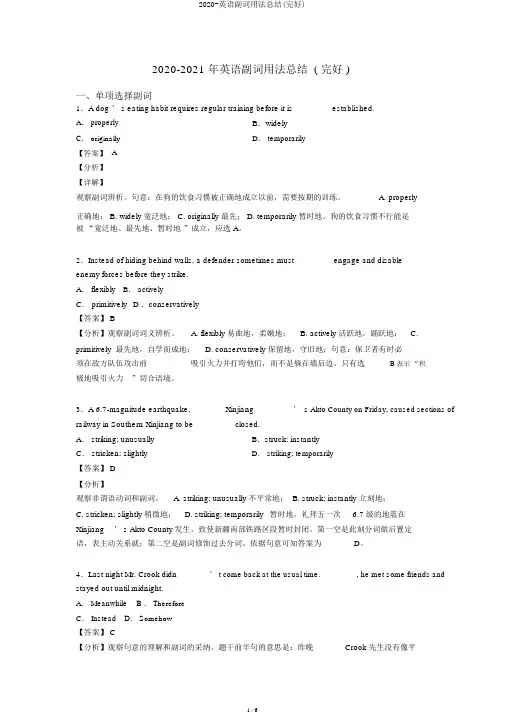
2020-2021 年英语副词用法总结 ( 完好 )一、单项选择副词1.A dog ’ s eating habit requires regular training before it is ________ established.A. properly B.widelyC. originally D. temporarilyA【答案】【分析】【详解】观察副词辨析。
句意:在狗的饮食习惯被正确地成立以前,需要按期的训练。
A. properly正确地; B. widely 宽泛地; C. originally 最先; D. temporarily 暂时地。
狗的饮食习惯不行能是被“宽泛地、最先地、暂时地”成立,应选 A。
2.Instead of hiding behind walls, a defender sometimes must ________ engage and disableenemy forces before they strike.A. flexibly B. activelyC. primitively D .conservatively【答案】 B【分析】观察副词词义辨析。
A. flexibly 易曲地,柔嫩地; B. actively 活跃地,踊跃地; C. primitively 最先地,自学而成地; D. conservatively 保留地,守旧地;句意:保卫者有时必须在敌方队伍攻击前________吸引火力并打垮他们,而不是躲在墙后边。
只有选 B 表示“积极地吸引火力”切合语境。
3.A 6.7-magnitude earthquake, _______ Xinjiang’ s Akto County on Friday, caused sections of railway in Southern Xinjiang to be _________closed.A. striking; unusually B.struck; instantlyC. stricken; slightly D. striking; temporarily【答案】 D【分析】观察非谓语动词和副词。
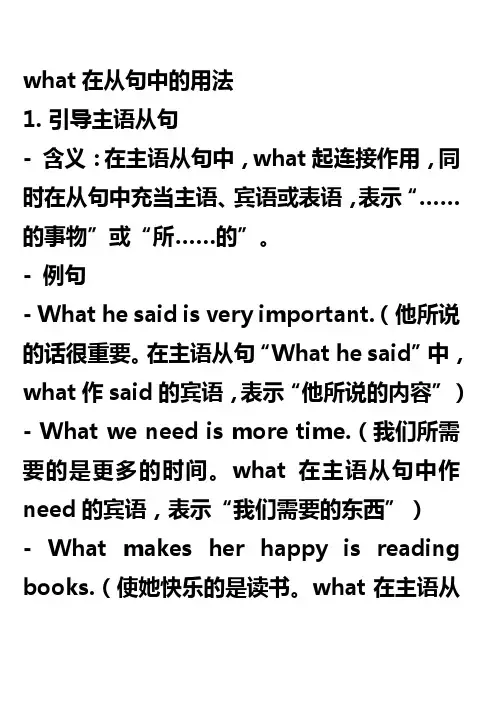
what在从句中的用法1. 引导主语从句- 含义:在主语从句中,what起连接作用,同时在从句中充当主语、宾语或表语,表示“……的事物”或“所……的”。
- 例句- What he said is very important.(他所说的话很重要。
在主语从句“What he said”中,what作said的宾语,表示“他所说的内容”)- What we need is more time.(我们所需要的是更多的时间。
what在主语从句中作need的宾语,表示“我们需要的东西”)- What makes her happy is reading books.(使她快乐的是读书。
what在主语从句中作主语,表示“……的事情”)2. 引导宾语从句- 含义:引导宾语从句时,what同样起连接作用,在从句中充当主语、宾语或表语,用于表示事物的内容、性质等。
- 例句- I don't understand what he means.(我不明白他的意思。
在宾语从句中,what作means的宾语,表示“他所指的意思”)- She told me what she had seen.(她告诉我她所看到的。
what在宾语从句中作seen的宾语,表示“她看到的事物”)- We should focus on what is really important.(我们应该关注真正重要的事情。
在宾语从句中,what作主语,表示“……的事情”)3. 引导表语从句- 含义:在表语从句中,what充当主语、宾语或表语,连接主句和从句,说明主语的内容、性质等。
- 例句- The problem is what we should do next.(问题是我们接下来应该做什么。
在表语从句中,what作do的宾语,表示“我们应该做的事情”)- Her hobby is what brings her joy.(她的爱好是给她带来快乐的东西。
一、Means过程1.简单介绍Means过程计算指定变量的综合描述计量,包括均值、标准差、总和、观测量数、方差等一系列单变量描述统计。
当观测量按一个分类变量分组时,Means过程可以进行分组计算。
例如,要计算某地区高考的数学成绩,Sex变量把考生分为男生和女生两组,Means过程可以分别计算男女生的数学成绩。
Means过程还可以给出方差分析表和线性检验结果。
使用Means过程求若干组的描述统计量的目的在于比较,因此必须求均值。
这是与Descriptive过程不同之处。
2.完全窗口分析Means过程的大部分功能可以完全由窗口实现,这给用户带来了很大的方便。
(1)Means主对话框按Analyze →Compare Means →Means的顺序单击,即可打开“Means”主对话框,如图1所示。
图1 Means主对话框(2)Dependent框该框中的变量作为因变量,通常认为受自变量影响或决定,因此被用来预测或建模。
要从源变量框中选取变量进入该框,只需选中所要选取的变量,然后按向右的箭头即可。
(3)Independent框该框中的变量是自变量,又被称为预测变量或解释变量。
要运行Means过程,该框中必须至少有一个变量。
要从源变量框中选取变量进入该框,同样只需激活所要选取的变量,然后按向右的箭头即可。
选中变量进入该框后,可以看到上方的【Next】按钮有效,单击该按钮进入下一层,在下一层的自变量将再细分样本。
要回到上一层,单击【Previous】按钮即可。
(4)Options 对话框单击Options按钮,即可打开“Options”对话框,如图2所示。
图2 Options 对话框①Cell Statistics框从左边框中选择要输出的统计量进入该框,该框中的统计量是输出时显示的统计量,其排列顺序即是输出时显示的顺序。
可供选择的统计量的意义如下:Sum(总和)、Number of cases(观测量数目)、Mean(均值)、Median (中位数)、Grouped median(分组中位数)、Standard error of the mean (均值标准误差)、Minimum(最小值)、Maximum(最大值)、Range(范围)、Standard deviation(标准差)、Variance(方差)、Kurtosis(峰度)、Standard error of kurtosis(峰度的标准差)、Skewness(偏度)、Standard error of Skewness(偏度的标准差)、First(首值)、Last(尾值)、Percentage of total sum(占总和的百分比)、Percentage of total N(占观测量总数的百分比)、Geometric mean(几何均数)、Harmonic mean(调和均数)。
计量经济学题库(超完整版)及答案计量经济学题库三、名词解释(每⼩题3分)1.经济变量 2.解释变量3.被解释变量4.内⽣变量 5.外⽣变量 6.滞后变量7.前定变量 8.控制变量9.计量经济模型10.函数关系 11.相关关系 12.最⼩⼆乘法13.⾼斯-马尔可夫定理 14.总变量(总离差平⽅和)15.回归变差(回归平⽅和) 16.剩余变差(残差平⽅和)17.估计标准误差 18.样本决定系数 19.点预测 20.拟合优度21.残差 22.显著性检验23.回归变差 24.剩余变差 25.多重决定系数 26.调整后的决定系数27.偏相关系数 28.异⽅差性 29.格德菲尔特-匡特检验 30.怀特检验 31.⼽⾥瑟检验和帕克检验32.序列相关性 33.虚假序列相关 34.差分法 35.⼴义差分法 36.⾃回归模型 37.⼴义最⼩⼆乘法38.DW 检验 39.科克伦-奥克特跌代法 40.Durbin 两步法41.相关系数 42.多重共线性 43.⽅差膨胀因⼦ 44.虚拟变量 45.模型设定误差 46.⼯具变量 47.⼯具变量法 48.变参数模型 49.分段线性回归模型50.分布滞后模型 51.有限分布滞后模型52.⽆限分布滞后模型 53.⼏何分布滞后模型 54.联⽴⽅程模型 55.结构式模型56.简化式模型 57.结构式参数 58.简化式参数 59.识别 60.不可识别 61.识别的阶条件 62.识别的秩条件 63.间接最⼩⼆乘法四、简答题(每⼩题5分)1.简述计量经济学与经济学、统计学、数理统计学学科间的关系。
2.计量经济模型有哪些应⽤? 3.简述建⽴与应⽤计量经济模型的主要步骤。
4.对计量经济模型的检验应从⼏个⽅⾯⼊⼿?5.计量经济学应⽤的数据是怎样进⾏分类的? 6.在计量经济模型中,为什么会存在随机误差项?8.总体回归模型与样本回归模型的区别与联系。
9.试述回归分析与相关分析的联系和区别。
11.简述BLUE 的含义。
mean 的14种用法解释vt. 意味;想要;意欲过去式meant过去分词meant现在分词meaning ]1、mean vt. 表示…的意思;意思是;If you can bear with me a little longer, you will see what I mean. 如果你能再容忍我一会儿,你就会明白我的意思了。
Don't juggle with words any more. I know what you mean. 不要再玩文字游戏了,我知道你是什么意思。
She never meant anything of the sort.她决没有那种意思。
What does this word mean?这个词是什么意思?So what does this all mean? 那么这都意味着什么呢?I mean, what is this? 我的意思是这是什么?They do not know what the words mean. 他们不知道这些字的意思是什么。
Yeah I see what you mean. 是的,我明白你的意思。
I mean I like both of the companies. 我的意思是这两家公司我都喜欢。
I mean this one, not that one.我指的是这个, 不是那个。
I mean business.我是当真的。
He means this house for his daughter.他预定把这栋房子给女儿。
2、意味着;即是:Money means nothing to her.她视金钱如粪土。
Health means everything.健康就是一切。
The dark clouds mean rain.乌云意味着要下雨。
His promotion means a raise in salary.他的提升意味着要增加薪水。
What does all this mean to you? 这一切对你意味着什么?3、意指;意谓:What do / did you mean by...?该句型的意思是“你(做…)……是什么意思?”Whom did she mean by them? 她说的“他们”是指谁? What does he mean by cancelling his performance?他取消演出是什么意思?What do you mean by acting like this? 你这样做是什么意思?What do you mean by saying that?你那样说是什么意思? What does that word mean? (=What is meant by that word?)那个词作什么解释?What do you mean by opening my letters without permission? 你未经允许就私拆我的信是什么意思?What do I mean by this? 我这样说的意思是什么呢?4、打算;意欲:I didn't mean you to read the book.我本意不想让你看这本书。
We mean you no harm.我们对你没有恶意。
He means you no harm.他无意伤害你。
5、有某种重要性:Her son means a lot to her.儿子对她来说十分重要。
£30 means everything to a poor man.30英镑对一个穷人来说是至关重要的。
6、预定;注定:be meant for该短语的意思是“打算给予;打算作……用”。
She was meant for an engineer.原先打算让她当工程师。
What is this meant for? 这准备作什么用?These rooms are meant for the children's centre. 这些房间是打算用作少年活动中心的。
But what does that mean for your business? 但是,这对于您的企业意味着什么?This was meant for a joke.这是笑话。
He was meant for [to be] a doctor.本来是准备把他培养成为医生的。
Mother didn't mean to be a teacher, but that's the way it turned out.母亲本来不想终生当教师,但结果还是走了这条路。
7、mean doing sth的意思是“意味着(必须要做某事或导致某种结果)”,其主语通常是指事物的词。
例如:In some parts of London, missing a bus means_______ for another hour.A. waitingB. to waitC. waitD. to be waiting句意:在伦敦的一些地方,错过一班公共汽车意味着再等一个小时。
正确答案为A。
Being a student means studying hard. 作为一个学生,(意味着)你要努力学习。
Success means working hard. 成功意味着工作努力。
8、mean to do sth.的意思是“打算或企图做某事”, 其主语通常是表示人的名词或代词,其过去完成式表示“本来打算做某事”。
例如:What do you mean to do with it? 你打算把它怎样处理? We mean to call on you tomorrow. 我们打算明天看望你。
He had meant to leave on Sunday, but has stayed on. 他本来想星期天走的,但又留了下来。
9、don't mean to do sth. 是其否定式,通常表示“无意做某事”。
例如:John really upset Granny,but I'm sure he did not mean to. 约翰真让奶奶心烦, 不过我相信他是无意的。
He did not mean to go.他没打算去。
10、mean sb. to do sth.的意思是“打算让某人做某事”。
例如:I mean you to work as our spokesman. 我想请你当我们的代言人。
Do you really mean him to believe that your plan was right? 你真打算让他相信你的计划是对的吗?11、mean后接名词或副词,意为“表示;打算;存心”等意思;后接that 从句,意为“表示……”。
例如:“I meant well,” he said. 他说,“我是好意。
”The sign means that the road is blocked. 这个标志表示此路不通。
12、mean用来解释某个词语的含义mean 可用来解释某个词语的含义,表示“意思是……”,其后面的单词形式常与被解释的单词形式保持一致。
如解释一个动词时,后接动词不定式;解释一个动名词,后接动名词形式。
例如:“Quake” means “to shake”. “Quake”的意思是“震动”。
Having good table manners means knowing, for example, how to use knives and forks, when to drink a toast and how to behave at the table.餐桌上,懂礼貌意味着了解诸如如何使用刀叉,该何时祝酒,如何体面用餐等。
13、固定短语It was no mean feat to get him to agree.要他同意绝非易事。
by means of==With the use of; owing to:使用;由于:They succeeded by means of patience and sacrifice.他们靠耐心和牺牲而取得了成功by no means==In no sense; certainly not:并没有;绝不:This remark by no means should be taken lightly.这次讲话绝不能等闲视之be meant (to do) [主英国英语]必须做;应该做Do you mean to say …? 难道…吗? 你的意思是说…吗? mean ill (to someone或by someone) (对某人)怀着恶意,(对某人)存心不良mean much (或a great deal)to someone 对某人极为可贵;对某人很重要mean well by (或towards,to)someone 对某人怀好意Do you still believe that I don't mean well by you?你还相信我对你不怀好意么?Do you still believe that I do not mean well by you ?你还相信我对你不怀好意么?I wasn't hungry; I only ate that big meal because your mother meant well by us.我并不饿,我吃那顿丰盛的饭只是因为你的母亲待我们盛情善意。
We all know that he means well by you.我们都知道他对你是一番好意。
14、mean 形容词a.1.吝啬的,小气的[(+about/over/with)]Her husband is very mean about money.她的丈夫在金钱上很吝啬。